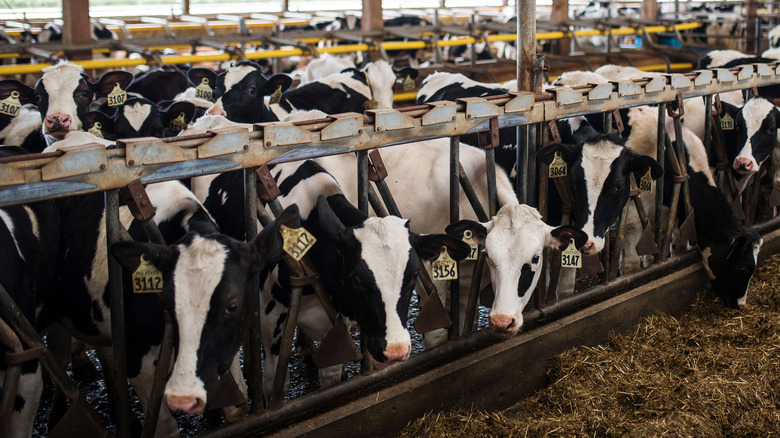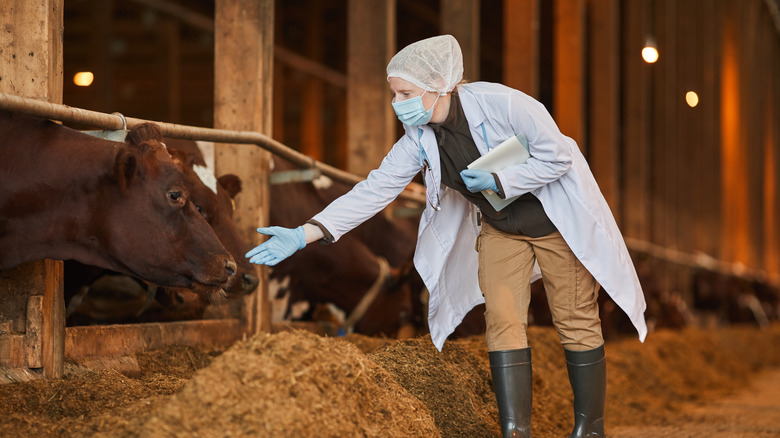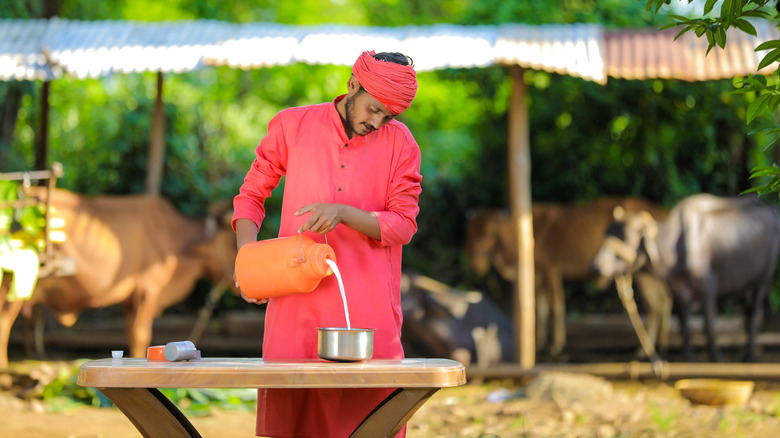How Artificial Intelligence Could Change The Dairy Farming Industry
There are few industries as old-fashioned as dairy farming, an ancient form of agriculture that can be traced back over 11,000 years, according to ThoughtCo. However, some agricultural artificial intelligence developers are hoping to modernize the milk industry with the help of a slate of futuristic tools that could change dairy farming forever.
Although the agriculture AI industry was valued at approximately $519 million in 2019, economists believe that high-tech farming is about to experience a major boom, estimated to grow into a $2.6 billion business by 2025 (via California Review Management).
Current and forthcoming AI-driven agricultural technology include futuristic farming tools like robot farmhands, which could help solve labor shortage issues by performing manual tasks; predictive software, which can help monitor and predict soil conditions, weather patterns, and other environmental elements; and data capturing drones that can pinpoint patches of diseased or pest-infested crops, making it easier to eradicate crop killers before they become an insurmountable — and expensive — problem.
While a large portion of the current farming AI has been focused on plant-based agriculture and crop production, companies like CattleEye, a U.K.-based cow monitoring company, intend to modernize the dairy industry one farm at a time using this sophisticated technology.
AI can help detect early-stage cattle diseases
According to BBC News, the cattle-centric artificial intelligence company — which was co-founded in 2019 by Terry Canning, the son of a dairy farmer in Northern Ireland — helps detect the early stages of lameness in cattle using a network of cameras that carefully monitors the cows during their day-to-day lives. Lameness, which is defined as pain in a cow's limbs due to infection or injury, causes the productivity of the sick cow to plummet, often resulting in the cow being slaughtered if not treated quickly (via SDSU).
CattleEye claims that its software, which is currently being used to monitor around 20,000 cows across the U.S. and U.K., can not only help with animal welfare, but also the reduction of carbon emissions. The company "calculated that if you can reduce lameness levels by 10% on a farm, there's a saving of half a ton of carbon per cow per year," Canning told BBC News.
According to the World Economic Forum, similar AI technology could be particularly beneficial to the fast-growing Indian dairy industry, a $225 billion per year operation that, as of November 2020, produces approximately 25% of the world's milk.
India, which became the largest dairy-producing nation in the world in 2016, is home to a staggering 100 million dairy farmers. However, the dairy industry of this nation faces a slate of unique challenges, including rampant cattle theft, frequent insurance conflicts, and the spread of disease among their herds.
These modern tools could revolutionize India's dairy industry
Artificial intelligence could help solve India's issue of cattle theft — which has fostered a high level of distrust between farmers and insurance companies — by utilizing cattle facial recognition software currently being produced by companies like MoooFarm, an India-based tech company that offers a slate of digital livestock monitoring services.
Futuristic technology could also help reduce the spread of diseases or alert farmers to when a cow is preparing to give birth, shares BBC News. One of the most popular AI tools currently used across the dairy industry is a high-tech collar worn around the cattle's necks that records health data in real time, helping to catch early-stage diseases and other health issues (via Chicago Tribune).
While these forward-thinking technologies have the potential to change the dairy industry as we know it, there are numerous roadblocks to the implementation of AI on farms across the globe. In addition to restricted access to rural areas, another detriment to the expansion of agricultural AI is reluctant farmers who are hesitant to install expensive technology to do tasks that humans have been doing for thousands of years. "The cost of the technology just can't be borne by our milk price," Dr. Sarah Lloyd, a Wisconsin-based dairy farmer, told BBC News.
However, as artificial technology continues to advance, offering life-saving — and money-saving — tools to farmers across the world, it's likely that many of the farms of the future will have to adopt these more modern tools to keep up.


